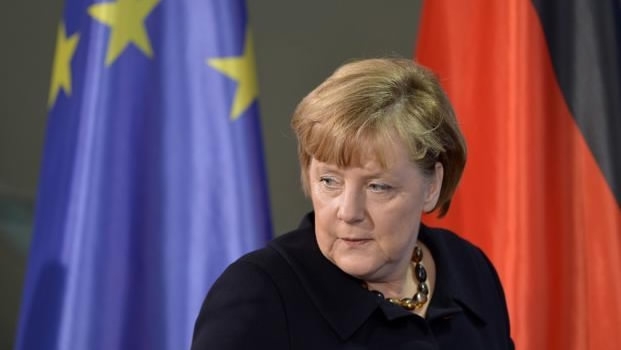
World
18:41, 18-Oct-2017
Weakened Merkel scrambles to form government

German Chancellor Angela Merkel, weakened by poor election results, will from Wednesday seek to forge an unlikely governing coalition from a motley crew of parties that span the political spectrum.
Merkel's conservatives, who won a September 24 vote without a clear majority, will hold exploratory talks with the liberal and pro-business Free Democrats (FDP) from 1000 GMT and then the left-leaning and environmentalist Greens from 1430 GMT.
To avoid a breakdown that would force new elections, all sides will in the coming weeks have to hammer out tough compromises on thorny topics from immigration to EU reform and climate policy.
If the initial talks on Wednesday go well, all sides will meet jointly on Friday to launch negotiations that could potentially form a government by January.
The delicate negotiations come as Merkel, who has long ruled as a presidential-style chancellor, was increasingly described as a lame-duck leader in her final term and past the zenith of her power.

German Chancellor Angela Merkel. /AFP Photo
German Chancellor Angela Merkel. /AFP Photo
Critics are snapping at the heels of the veteran leader for delivering the worst poll result since 1949 for her Christian Democrats (CDU), followed by a state election loss last Sunday.
The usually pro-Merkel Bild newspaper condemned her insistence that she bore no blame for her party's defeat in Lower Saxony, charging that she and her party "refuse to see what they've done wrong".
"Up until two years ago Merkel appeared untouchable," said the Sueddeutsche Zeitung daily.
"That aura of invincibility is now gone. Her power, too, is on the wane. If the CDU had any kind of challenger waiting in the wings, Merkel would have reason to worry."
Massive hurdles
If trouble is brewing in Merkel's party, her more conservative Bavarian allies, the CSU, are in open disarray, fearing another poll drubbing in state elections next year.
Having long railed against Merkel's decision to allow in more than one million asylum seekers since 2015, the CSU has signaled a sharp shift to the right to win back voters from the anti-immigration, Alternative for Germany (AfD).
The CSU's Alexander Dobrindt said Sunday's election win for Austrian right-wing candidate Sebastian Kurz showed that the CDU/CSU must "position ourselves as a conservative force in these negotiations".

German Chancellor Angela Merkel poses for selfies with Syrian refugees in Schwerin, northern Germany, on 19 September 2017. /AFP Photo
German Chancellor Angela Merkel poses for selfies with Syrian refugees in Schwerin, northern Germany, on 19 September 2017. /AFP Photo
Such talk only heightens distrust with the Greens, a party that emerged out of the 1960s and 70s protest movement against the Vietnam War and nuclear weapons, and which favors a multicultural society that welcomes refugees.
Greens leader Juergen Trittin pointed to growing right-wing populist tendencies in the CDU/CSU bloc and warned that their hardline demands on the refugee issue would present "massive hurdles".
But Dobrindt warned days ago that his party would tolerate no leftist "nonsense" from the Greens.
Power crumbling
The other partner in the coalition talks, the FDP, are an easier fit, having previously served with the conservatives for lengthy stretches, until they humiliatingly crashed out of the Bundestag at the last election in 2013.
Its youthful leader Christian Lindner, who led the party back into the Bundestag, has presented his own tough demands as he eyes the powerful finance ministry.
On the eve of the talks, Lindner even cautioned Merkel to refrain from any bold moves at an EU level, especially if it would cost German taxpayers, before a new government is formed.

Timeline of Angela Merkel's political life. /CGTN Graphic
Timeline of Angela Merkel's political life. /CGTN Graphic
"I expect that Merkel...makes it clear that her government is only performing a caretaker role," he told the Frankfurter Allgemeine Zeitung newspaper, "Germany is currently not in a position to take decisions."
Given the competing interests, and weeks of haggling over posts and policy ahead, news site Spiegel Online predicted that "with a bit of luck, Germany may have a new government by January."
"Germany is experiencing a strange phenomenon," the commentary said.
"A new coalition is being negotiated by parties who don't really want it, while the aura and the power of the former and future Chancellor Angela Merkel is crumbling."
Source(s): AFP

SITEMAP
Copyright © 2018 CGTN. Beijing ICP prepared NO.16065310-3
Copyright © 2018 CGTN. Beijing ICP prepared NO.16065310-3